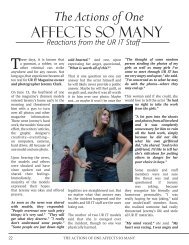You also want an ePaper? Increase the reach of your titles
YUMPU automatically turns print PDFs into web optimized ePapers that Google loves.
According to the Diagnostic<br />
and Statistical Manual of Mental<br />
Disorders (DSM) latest version of<br />
NPD a person needs to present<br />
five or more of the following<br />
symptoms:<br />
1. Has a grandiose sense of<br />
self-importance (exaggerates<br />
achievements and talents, expects<br />
to be recognized as superior without<br />
commensurate achievements).<br />
One of the hardest situations is<br />
finding yourself interested in or<br />
romantically involved with a person<br />
who has NPD. There is usually not a<br />
“happy ending” in this relationship<br />
as the complexity of their symptoms<br />
will eventually keep them from<br />
being able to have normal conflict<br />
resolution when problems arise.<br />
a way that seems distant or cold.<br />
They will no longer embody the<br />
person they were at the beginning<br />
of the relationship. In the beginning<br />
is when they usually “love bomb”<br />
(shower their interest with grand<br />
gestures, promises or words of<br />
being soul mates, etc.) their partner.<br />
This can be an incredibly painful<br />
2. Is preoccupied with fantasies of<br />
success, power, brilliance beauty<br />
or the ideal mate.<br />
We live in a time where we are<br />
encouraged to do what makes us<br />
happy no matter the cost. With<br />
this selfish mentality comes some<br />
confusion. How can we tell the<br />
difference between a person who<br />
has self-absorbed tendencies<br />
versus a person who is a narcissist?<br />
To understand in full how to<br />
differentiate between the two, I<br />
think we need to discuss why it’s<br />
important to actually have some<br />
narcissistic traits.<br />
During adolescence, having a<br />
level of self-absorbed confidence<br />
helps us come into our own. It<br />
builds strength and teaches us<br />
perseverance. It’s normal to have<br />
selfish traits when we’re teenagers<br />
because we’re learning who we are<br />
and trying to stand out from the<br />
shadows of our peers. However,<br />
once adulthood has been reached<br />
and a person finds it difficult<br />
to create lasting friendships/<br />
relationships, this could be a telltale<br />
sign that there is something more<br />
serious going on.<br />
The symptoms of NPD (narcissistic<br />
personality disorder) can be so<br />
severe that they will always interfere<br />
with your personal and professional<br />
life because there is an inability<br />
to recognize the needs of anyone<br />
other than yourself. People who<br />
are narcissists may find it difficult<br />
to remain in the same place for too<br />
long. Often they will find themselves<br />
needing to relocate to avoid the<br />
confrontations they’ve created at<br />
work, with friends or in relationships<br />
due to these narcissistic symptoms.<br />
NPD is rare or may be perceived<br />
as being rare due to the lack of<br />
people who seek treatment for it.<br />
It is a psychological disorder that<br />
can be difficult to diagnose since<br />
admitting to having these traits<br />
would go against a narcissist’s<br />
natural tendency to think highly of<br />
themselves. It would mean having<br />
to admit there is wrong doing on<br />
their end and a need to rectify their<br />
actions toward others. NPD affects<br />
more males than females and can<br />
begin during the teen years or<br />
early adulthood.<br />
3. Believes that he or she is<br />
“special” and unique and can only<br />
be understood or associate with<br />
those who are just as special or<br />
who are of a high-status.<br />
4. Requires excessive admiration<br />
especially by people in the<br />
workplace and their current love<br />
interest.<br />
5. Has a sense of entitlement or<br />
unreasonable expectations of<br />
receiving favorable treatment or<br />
automatic compliance with his or<br />
her expectations.<br />
6. Is interpersonally exploitative<br />
or takes advantage of others to<br />
achieve his or her own ends.<br />
7. A lack of empathy and<br />
unwillingness to recognize or<br />
identify with the feelings and<br />
needs of others.<br />
8. Is envious or believes others are<br />
envious of them.<br />
9. Shows arrogant, haughty<br />
behavior or attitudes.<br />
They have a need for something<br />
called NS (narcissistic supply). This<br />
is the admiration, attention or<br />
flirtation etc. they will receive from<br />
a current suitor at the beginning of<br />
a relationship. A person with NPD<br />
will usually present themselves in a<br />
charming, confident manner that will<br />
appeal to and attract the opposite<br />
sex. They usually will put their best<br />
foot forward in the beginning to<br />
receive the NS they need to ensure<br />
their grandiose sense of self. At the<br />
same time they will set this person<br />
on an impossible pedestal to live<br />
up to. Since a narcissist is unable to<br />
take any type of criticism or show<br />
empathy towards another’s needs,<br />
the new relationship will come to<br />
the same inevitable end as the rest.<br />
When the narcissist has reached<br />
the point of wanting out of a<br />
relationship it is typical for them to<br />
simply stop all communication in<br />
and confusing situation to find<br />
yourself in. There is usually a trail of<br />
emotional destruction a narcissist<br />
will leave behind them. If you take<br />
the time to look at the red flags in<br />
the beginning you may be able to<br />
avoid this situation altogether.<br />
It can be difficult and painful<br />
dealing with someone with NPD as<br />
well as being a person who has NPD<br />
since the road is usually a lonely<br />
one. If you believe you or someone<br />
you know may have this disorder<br />
the best route is to seek the help<br />
of a medical professional. As of<br />
now there is no medication to help<br />
this disorder, but self-awareness<br />
and therapy, along with medicine<br />
for any depression or anxiety that<br />
may accompany the disorder, could<br />
prove to be very helpful.<br />
Article by: Jessica Martin<br />
42 AM I A NARCISSIST?<br />
AM I A NARCISSIST?<br />
43

















